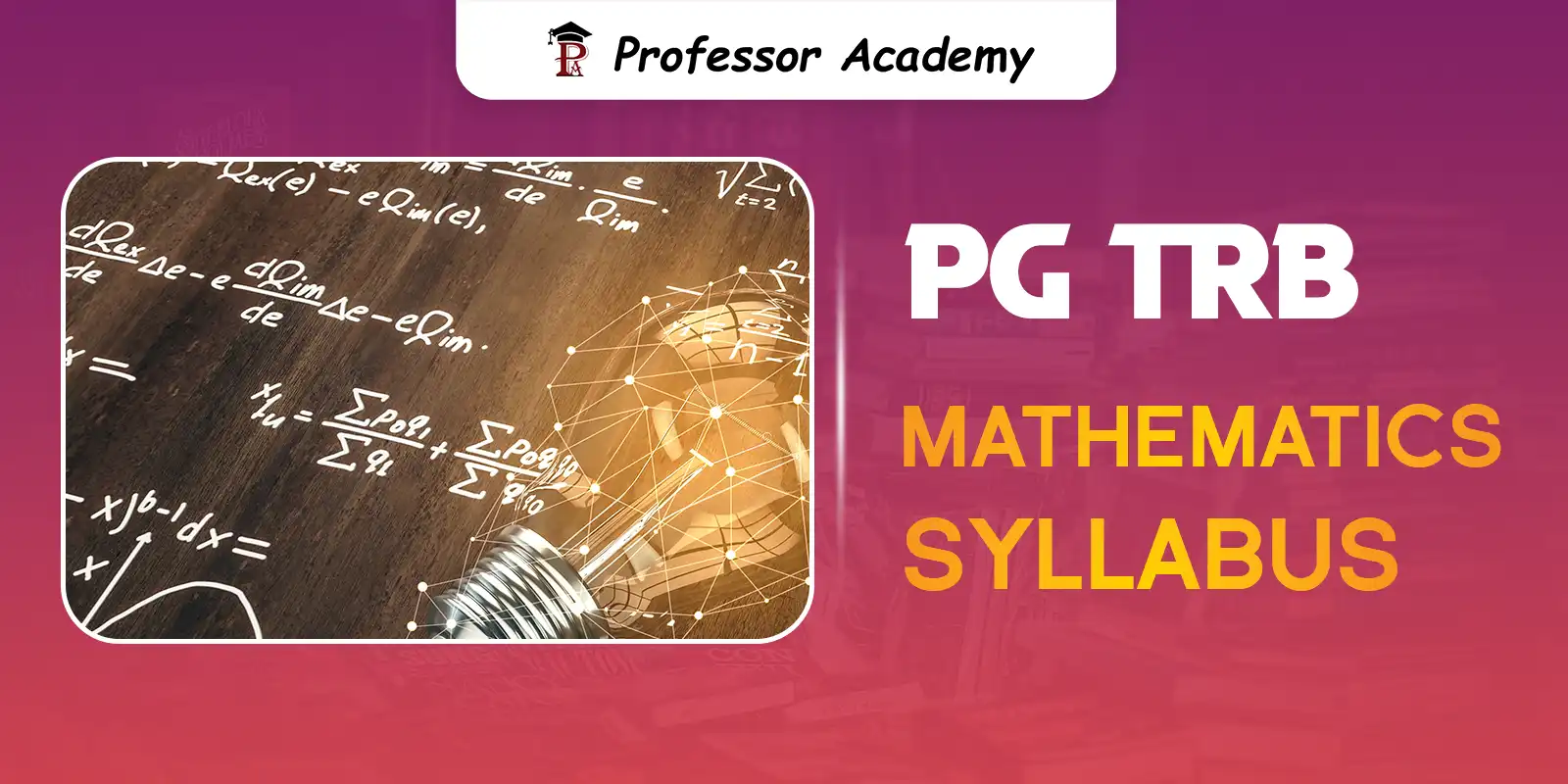PG TRB Mathematics

Take the lead in your teaching career with the detailed PG TRB Mathematics syllabus.
It covers Algebra, Calculus, Real Analysis, Complex Numbers, Differential Equations, and Statistics.
With structured coaching from Professor Academy, students gain conceptual mastery and problem-solving efficiency.
Check out the complete PG TRB Mathematics syllabus and start preparing with purpose.
PG TRB Mathematics Syllabus
Unit I – ALGEBRA
Groups – Examples – Cyclic Groups – Permutation Groups – Lagrange’s theorem – Normal subgroups – Homomorphism – Cayley’s theorem – Cauchy’s theorem – Sylow’s theorems – Finite Abelian Groups.
Rings – Integral Domain – Field – Ring Homomorphism – Ideals and Quotient Rings – Field of Quotients of Integral domains – Euclidean Rings – Polynomial Rings – Unique factorization domain.
Fields – Extension fields – Elements of Galois theory – Finite fields.
Vector Spaces – Linear independence of Bases – Dual spaces – Inner product spaces – Linear transformations – Rank – Characteristic roots – Matrices – Canonical forms – Diagonal forms – Triangular forms – Nilpotent transformations – Jordan form – Quadratic forms and Classification – Hermitian, Unitary and Normal transformations.
Unit II – REAL ANALYSIS
Elementary set theory – Finite, countable and uncountable sets – Real number system as a complete ordered field – Archimedean Property – Supremum, infimum, Sequences and Series – Convergence – limit supremum – limit infimum – The Bolzano – Weierstrass theorem – The Heine – Borel Covering theorem – Continuity, Uniform Continuity, Differentiability – The Mean Value theorem for derivatives – Sequences and Series of functions – Uniform convergence.
Riemann – Stieltjes integral: Definition and existence of the integral – properties of the integral – Integral and Differentaition – Integration of vector valued functions – Sequences and Series of functions: Uniform convergence – Continuity, Integration and Differentiation.
Power series – Fourier series. Functions of several variables – Directional derivative – Partial derivative – derivative as a linear transformation – The Inverse function theorem and The Implicit function theorem.
Unit III – TOPOLOGY
Topological spaces – Basis – The order Topology – The product Topology – The subspace Topology – Closed sets and limit points.
Continuous functions – The box and product Topologies – The matrix Topology.
Connected spaces – Connected subspaces of the real line – Components and local connectedness – compact spaces – Compact subspaces of the real line – Limit point compactness – Local compactness.
Countability and separation Axioms – Normal spaces – The Urysohn Lemma – The Urysohn metrization theorem – The Tietze extension theorem.
Unit IV – COMPLEX ANALYSIS
Introduction to the concept of analytic function: Limits and continuity – Analytic functions – Polynomials and rational functions – Elementary theory of power series – Maclaurin’s series – Uniform convergence – Power series and Abel’s limit theorem – Analytic functions as mapping – Conformality arcs and Closed curves – Analytical functions in regions – Conformal mapping – Linear transformations – the linear group, the cross ratio and symmetry.
Complex integration – Fundamental theorems – line integrals – rectifiable arcs – line integrals as functions of arcs – Cauchy’s theorem for a rectangle – Cauchy’s theorem in a Circular disc – Cauchy’s integral formula: The index of a point with respect to a closed curve – The integral formula – Higher derivatives – Local properties of Analytic functions and removable singularities – Taylor’s theorem – Zeros and Poles – The local mapping – The maximum modulus Principle.
Unit V – FUNCTIONAL ANALYSIS
Banach Spaces – Definition and examples – Holder’s inequality and Minkowski’s inequality – Continuous linear transformations – The Hahn-Banach theorem – Natural imbedding of X in X** – The Open mapping and The Closed graph theorem – Properties of conjugate of an operator.
Hilbert spaces – Orthonormal bases – Conjugate space H* – Adjoint of an operator – Projections – Matrices – Basic operations of matrices – Determinant of a matrix – Determinant and Spectrum of an operator – Spectral theorem for operators on a finite dimensional Hilbert space – Regular and Singular elements in a Banach Algebra – Topological divisor of zero – Spectrum of an element in a Banach algebra – The formula for the spectral radius – Radical and semi-simplicity.
Unit VI – DIFFERENTIAL GEOMETRY
Curves in spaces – Serret – Frenet formulae – Locus of centers of curvature – Spherical curvature – Intrinsic equations – Helices – Spherical Indicatrix Surfaces – Curves on a surface – Surface of revolution – Helicoids – Gaussian curvature – First and Second fundamental forms – Isometry – Meusnier’s theorem – Euler’s theorem- lines of curvature – Dupin’s Indicatrix – Asymptotic lines – Edge of regression – Developable surfaces associated to a curve – Geodesics – Conjugate points on Geodesics.
Unit VII – DIFFERENTIAL EQUATIONS
Ordinary Differential Equations
Linear differential equation with constant and variable co-efficients – Linear dependence and independence – Wronskian – Non homogeneous equations of order two and n – Initial value problems for nth order equations – Second order equations with ordinary point and regular singular points – Legendre Equations – Bessel’s equation – Hermite’s equation and their properties – Existence and Uniqueness of solutions to first order equations – Exact equation – Lipschitz condition – Non local existence of Solution – Approximation to Uniqueness of solutions.
Partial Differential Equations
Lagrange and Charpit methods for solving first order Partial Differential equations – Classification of Second order partial differential equations – General solution of higher order partial differential equation with constant co-efficients – Method of separation of variables for Laplace, Heat and Wave equations (upto two dimensions only).
Unit VIII – CLASSICAL MECHANICS AND NUMERICAL ANALYSIS
Classical Mechanics
Generalised Co-ordinates – Lagrange’s equations – Hamilton’s Canonical equations – Hamilton’s principle – Principle of least action – Canonical transformations – Differential forms and Generating functions – Lagrange and Poisson brackets.
Numerical Analysis
Numerical solutions of algebraic and transcendental equations – Method of iteration – Newton Raphson method – Rate of convergence – Solution of Linear algebraic equations using Gauss elimination and Gauss – Seidel methods.
Finite differences – Lagrange, Hermite and Spline Interpolation, Numerical differentiation and integration – Numerical solutions of Ordinary differential equations using Picard, Euler, Modified Euler and Runge- Kutta methods.
Unit IX – OPERATIONS RESEARCH
Linear programming problem – Simplex Methods – Duality – Dual Simplex Method – Revised Simplex Method – Integer Programming Problem – Dynamic Programming – Non linear programming – Network Analysis – Directed Network – Max Flow Min Cut theorem – Queuing theory – Steady State solutions of M/M/1, M/M/1 with limited waiting space, M/M/C, M/M/C with limited waiting space, M/G/1 models – Inventory models – Deterministic models with and without shortages – Single Price break models.
Unit X – PROBABILITY THEORY
Sample space – Discrete Probability – Independent events – Baye’s theorem – Random variables and Distribution functions (Univariate and Multivariate) – Expectation and Moments – Moment Generating function – Characteristic functions and Cumulants – Independent Random variables – Marginal and conditional distributions – Probability inequalities (Tchebyshev, Markov, Jensen) – Modes of convergence, Weak and Strong laws of large numbers – Central limit theorem (i.i.d case).
Probability distributions – Binomial, Poisson, Uniform, Normal, Exponential, Gamma, Beta, Cauchy distributions – Standard Errors – Sampling distributions of t, F and Chi square and their uses in tests of significance – ANOVA – Large sample tests for mean and proportions.
Download PG TRB Mathematics Syllabus
Enroll Now for a Successful PG TRB Journey!
Website: https://professoracademy.com/courses/pg-trb-maths-2024/
Contact Us: +91 7070701005 / +91 7070701009


